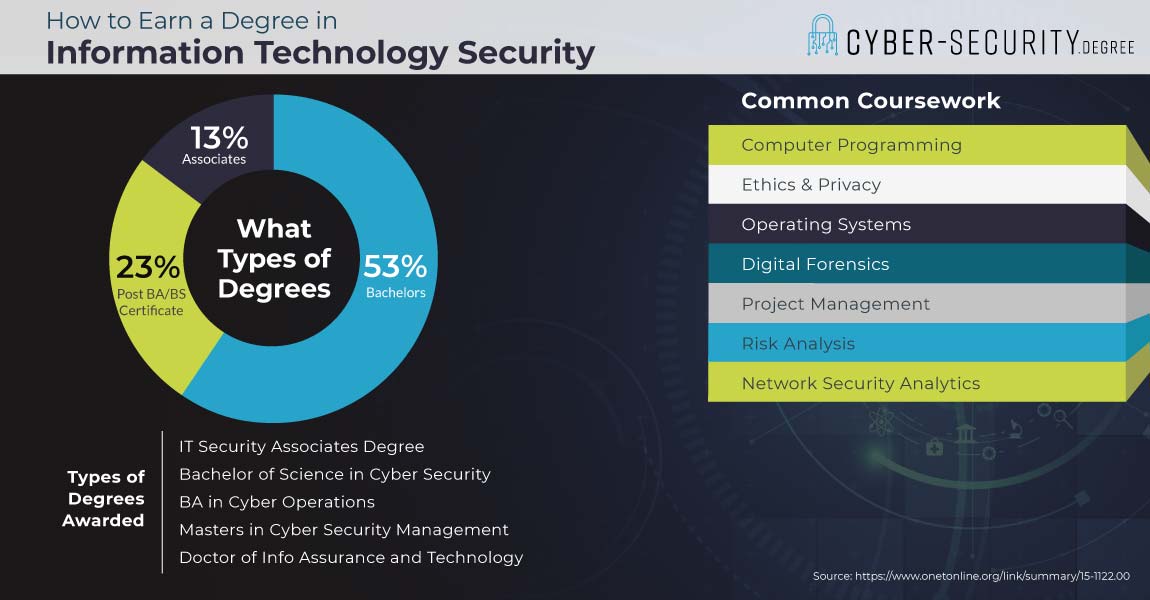What is an IT Security Degree?
An IT security degree is also Info Sec for short. It studies the ways to keep business data safe. Also, secure and private. A main focus of info sec is on industry tools. These protect a company’s information assets. Large and small.
High on this list is to guard against unauthorized access. But it doesn’t stop there. Businesses also need to know other things. For one, that no one is able to disclose or change information. Or, that no one can see, record or destroy their data. As such, many programs include extra anchor points.
Online social media is one. Here are a few others.
- Cryptography
- Mobile Computing
- Cyber Forensics
What are the 3 Principles of Information Security?
An IT security degree program touches on three main areas. These “AIC triad” are at the heart of info sec practices. And, are central to most study plans.
- CONFIDENTIALITY. This means putting security measures to keep data private
- INTEGRITY. Info needs to stay accurate and consistent. So no one should be able to tamper with it.
- AVAILABILITY. Only authorized users can access data to prevent breaches
Why is IT Security Important?
Info Sec is a growing concern. Cyber attacks are on the rise and many companies now store data in the “cloud”. Also, for most companies, information is their most vital asset. So protecting it is crucial.
- Protects the company’s ability to function
- Enables the safe use of apps used in IT systems
- Secures the data the company collects and uses
- Safe guards the technology a company uses
Purdue University Global
- Experience world-class education online: Purdue Global offers 180 programs at associate’s, bachelor’s, master’s and doctoral levels
- Courses taught by highly respected faculty members who are experts in their fields
- Competency-based ExcelTrack™ Programs may allow you to earn your degree faster and for less money
Popular Programs
Human Services, Business Administration & Management, Medical Assisting, Early Childhood Education…
Southern New Hampshire University
- Take advantage of some of the nation’s most affordable tuition rates, while earning a degree from a private, nonprofit, NEASC accredited university
- Qualified students with 2.5 GPA and up may receive up to $20K in grants & scholarships
- Multiple term start dates throughout the year. 24/7 online classroom access.
- Offering over 200 online degree
Popular Programs
Business Administration, Psychology, Information Technology, Human Services…
Types of IT Security Degrees
There are IT Security degrees at all levels. From associate and bachelor. To master’s and Phd.
Associates Degree in IT Security
An associate degree in IT security may serve a few goals. One is to provide transfer credits to a bachelor’s degree. The other, to prep you for the work force. Many programs also serve as study guides. So, when you graduate you might be able to take industry credential exams. The classes you take at this level are often very basic. You usually take 60 credit hours. And many go to general studies.
What You Need: High School Diploma or its equal
Term: About two years
Possible Next Steps: Bachelor’s Degree or entry level job. A few examples are, Technical Support Specialist, Web Developers, or Programmer.
Sample Classes:
- Statistics
- Intro to Computers
- Database Concepts
- Network Basics
Bachelor’s Degree in IT Security
A bachelor’s in IT security often serves to prep you to pursue a career. Most jobs in this field ask you to have one. So, many programs cover key skills and concepts.
To earn your degree often takes four years and 120 credits. And each year, your courses may get more detailed. As you do this, you may want to focus a bit. For instance, you may want to tack on an area of emphasis. If so, there are schools that offer options. Cloud computing or cyber security for example. Or homeland security and intelligence.
What You Need: High School Diploma or Equivalent. Or an associate degree.
Term: Usually four years
Possible Next Steps: Masters or PhD Degree. You may also pursue a career. Such as info sec analyst and others.
Sample Classes:
- Scripting Languages
- Computer and Network Security
- Cyber Warfare
- Operating Systems
- Managing Risk
Master’s Degree in IT Security
Some people study on and earn a master’s in IT security. Often, they already work in the field. But may be ready to step into a manager role. As such many programs cover leadership. Things like how to manage people, IT projects and budgets. You often need two years of full time study to earn a master’s degree. This since most programs cover about 36 credits.
What You Need: Bachelor’s, and maybe work experience
Term: About two years
Possible Next Steps: PhD. Or a manager role. For instance, Computer & Info Systems Managers. And Computer & Info Research Scientists
Sample Classes:
- Game Theory
- Incident Response
- Software Security
- Malware Analysis
PhD in IT Security
PhD in IT security programs are research degrees. So, they tend to ask you to be a thought leader. And, to contribute to your field in a new way. While the number of courses vary, they include research focused topics. Things like how to test a theory and present data.
What You Need: Bachelor’s and / or Masters
Term: About eight years
Possible Next Steps: Professor, consultant, expert. Or high level roles like Chief Information Security Officer
Sample Classes
- Tech & Research
- Policy & Management
- Statistics
- Global Issues
Certifications
Certification exams are set by the Computing Technology Industry Association (CompTIA). This includes the CompTIA A+ examination. CompTIA A+ certification is for entry-level IT technicians. It’s mandatory for many information technology organizations.
Those with CompTIA A+ certification must recertify every three years. Certificate holders recertify by passing an exam or completing CompTIA’s continuing education program.
Other standard certifications include the CompTIA Network+ and CompTIA Security+ designations. CompTIA recommends you have at least nine months professional experience to take it. This is not required but is a recommendation. The same holds with five years of experience to take their Network+ examination.

How Long Does it take to get an IT Security Degree?
Top Schools for IT Security Degree Programs
NCES lists 14 institutions with IT Security Programs. And, from those schools, 2,661 degrees were awarded to students in 2016.
| School | 2016 Degrees awarded | 2018/19 Graduate Tuition |
| University of Maryland-University College | 1226 | $11,976 |
| Western Governors University | 652 | $5,780 |
| University of Phoenix-Arizona | 531 | $11,219 |
| American Public University System | 310 | $6,480 |
| ECPI University | 281 | $14,720 |
| Capella University | 211 | $8,726 |
| Baker College | 154 | $9,000 |
| Clover Park Technical College | 148 | $10,736 |
| Ferris State University | 136 | $17,910 |
| St Petersburg College | 129 | $ 9,717 |
Information Systems Security Careers
Jobs in info sec are in demand and will continue like this. Take info sec analysts for example. BLS.gov predicts a 32% rise in the number of jobs on the market. Of course, each career path is unique. Both in opportunity and salary. But most of these need a bachelor’s degree. And may be the perfect path to start with.
Computer Network Architects
These pros design and create networks. The networks help data transfer from one to the next. And, are vital to a business. While day to day tasks vary, there are three main ones. First, to build networks based on company needs. Then, two, to upgrade systems. Finally, to maintain these networks. As such, network architects need to stay up to date. So, a key part of their job is to research trends and tools.
Database Administrators
A data base administrator is a manager. So, a key role is to organize data for their employer. But they have other duties too. One is to back up current info. The other, to restore any lost data in the event of a breach.
Information Security Analysts
Info sec analysts assess security protocols and risks. They also install and manage security software. Another key task is to handle all breaches and hacks. So, many times they run pre tests to make sure safety measures work.
Network and Computer Systems Administrators
Those in this job set up, install, and maintain computer systems. Both local area networks (LANs) and wide area networks (WANs). They also manage other things. Like network segments, intranets, and other systems.
| Career | Entry level education | Average Median Salary | Projected growth rate |
Computer Network Architects | Bachelor’s | $109.020 | 6% |
Database Administrators | Bachelor’s | $90,070 | 11% |
Information Security Analysts | Bachelor’s | $98,350 | 28% |
Network and Computer Systems Administrators | Bachelor’s | $82,050 | 6% |
Professional Organizations
There are a few professional info sec agencies.
Information Systems Security Association (ISSA)
ISSA serves about 10K cyber security pros worldwide. As a non profit, they aim to promote global cyber security. And offer a few certifications. To do this, they function as a place to network and collaborate. So, being a member may help you expand your circles. At conferences, for instance. It costs about $85 to join. You need to do this each year, and follow steps to renew.
Internet Security Alliance
The Internet Security Alliance (ISA) serves a wide range of companies. For instance, Starbucks, AIG, Reuters, GE, Lockheed Martin and UNiSYS. A main ISA goal is to meld technology, public policy and economics. In doing so, they hope to create a sustainable system of cyber security. One of the benefits of being a member is their business focus. But the lowest level annual member fee is 10K. While they do not offer certifications, they do give awards.
Information Security Research Association
ISRA serves chapters world wide. They too are a non profit. And, aim to promote research and study in cyber security. There is no cost to become a member. As a research org, there are also no training programs. But, there are conferences, events, awards and so forth.



